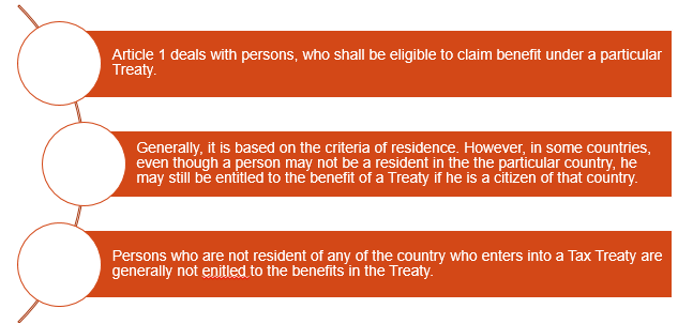| 2. |
For the purposes of this Convention, income derived by or through an entity or arrangement that is treated as wholly or partly fiscally transparent under the tax law of either Contracting State shall be considered to be income of a resident of a Contracting State but only to the extent that the income is treated, for purposes of taxation by that State, as the income of a resident of that State. |
For the purposes of this Convention, income derived by or through an entity or arrangement that is treated as wholly or partly fiscally transparent under the tax law of either Contracting State shall be considered to be income of a resident of a Contracting State but only to the extent that the income is treated, for purposes of taxation by that State, as the income of a resident of that State. |

Comments: –
Article 1(2) of OECD and UN Model Conventions are identical, and deal with entities like partnership firms, Trust etc, which are treated as wholly, or partly as fiscally transparent for tax purposes. Fiscally transparent entities are entities, who are not taxable on income derived by them, but the tax on their income is paid by owners/persons having interest in such entities.
This clause provides that if the income is earned by an entity (Say UK entity), which is treated wholly or partly, fiscally transparent under the tax law of UK, it shall be considered as income of a resident of UK, but only to the extent that such income is treated by UK as an income derived by a resident of that State.
For example: –
Say there is a UK based partnership firm (which is treated as a fiscally transparent entity for UK purpose), which derives professional income from India to the extent of USD 100,000. Out of two equal partners, one of the partners is a US resident. Income derived by US partner is not considered by UK as income derived by a resident of UK.
In such a case, income derived by a UK based partnership firm from India, shall be considered as income derived by a UK resident, and eligible for the India UK Treaty benefit to the extent of USD 50,000, since UK does not consider remaining 50% earned by US partner as an income derived by a resident of UK. |





